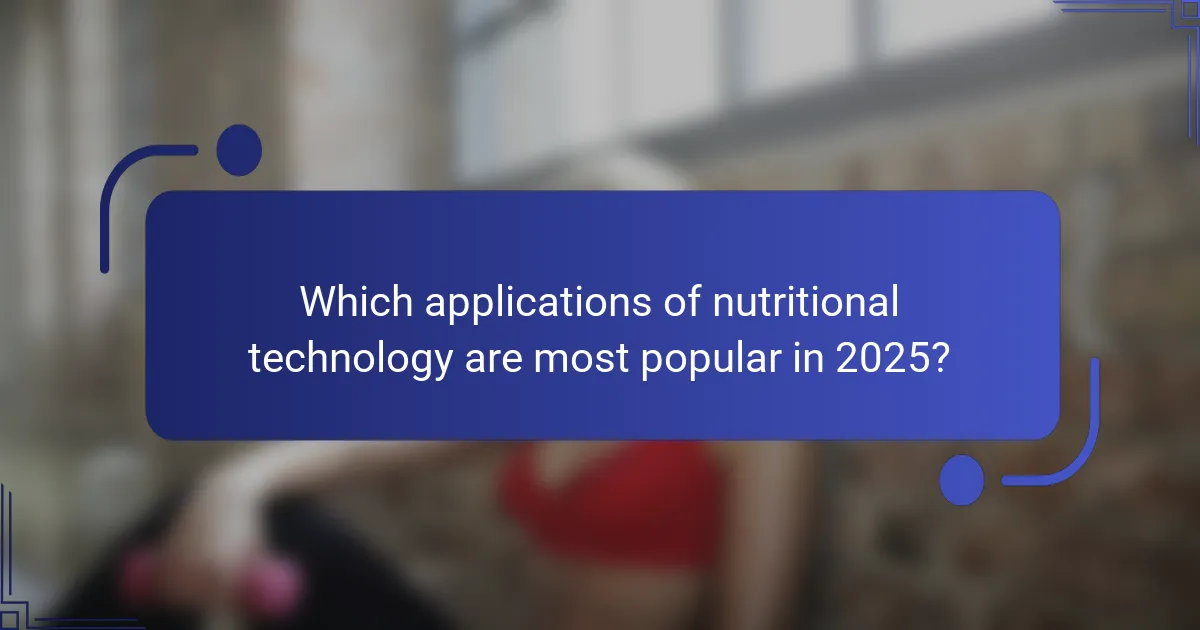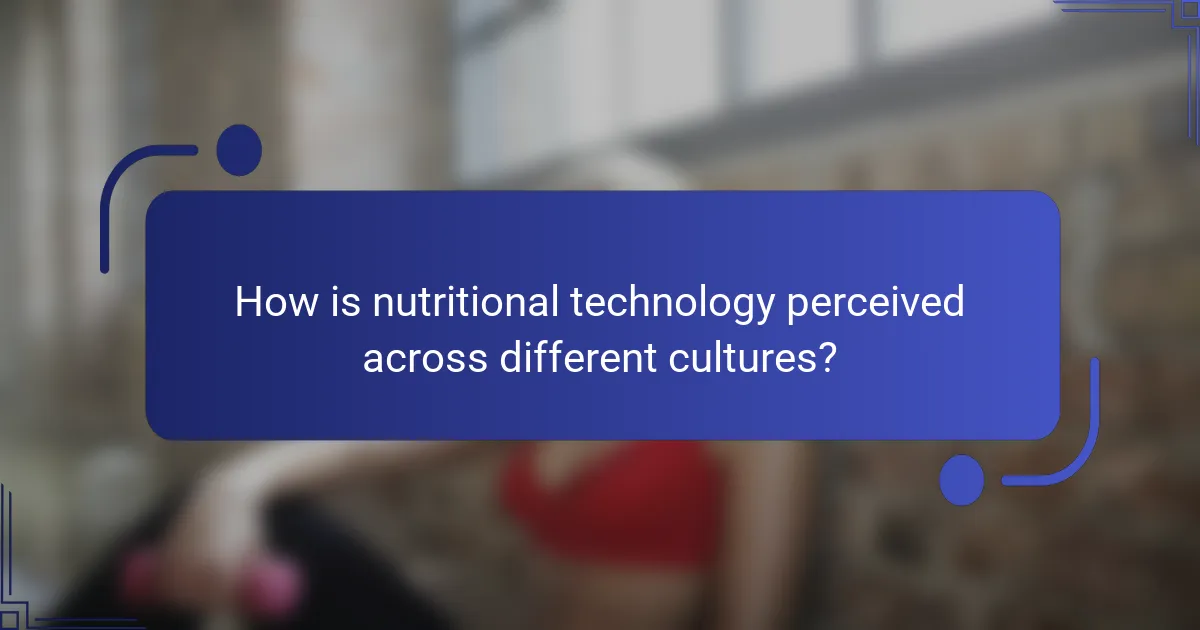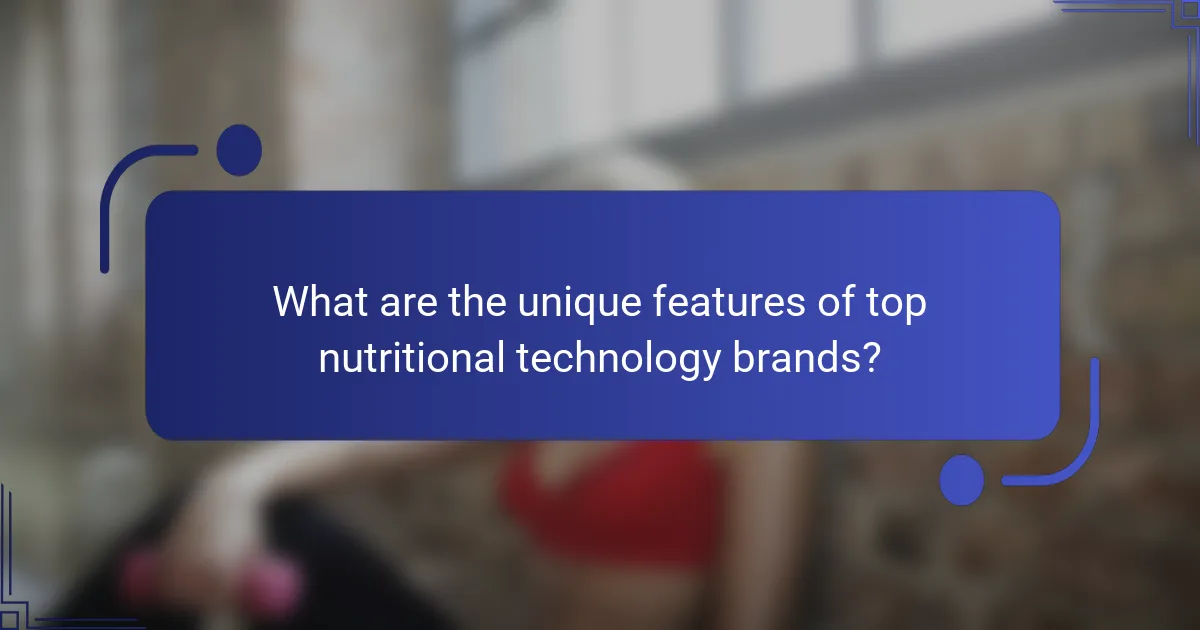Nutritional technology significantly enhances wellness through personalized dietary solutions, advanced tracking tools, and improved nutrient absorption. This article explores its applications, including smart kitchen appliances and wearable health devices, while addressing cultural perceptions and industry challenges. Key innovations and brand features will also be highlighted to illustrate how these technologies can optimize health outcomes.

What are the key benefits of nutritional technology for wellness?
Nutritional technology offers significant benefits for wellness, including personalized dietary solutions, enhanced nutrient absorption, and improved health monitoring. These innovations help individuals optimize their nutrition based on unique health needs.
Key benefits include:
1. Personalized nutrition plans that cater to individual health profiles.
2. Advanced tracking tools that monitor dietary intake and health metrics.
3. Enhanced nutrient bioavailability through innovative food processing techniques.
4. Integration of AI for tailored dietary recommendations.
These applications lead to better health outcomes, making nutritional technology a crucial component of modern wellness strategies.
How does nutritional technology improve health outcomes?
Nutritional technology enhances health outcomes by personalizing dietary recommendations and improving nutrient absorption. Innovations like wearable devices and apps track nutritional intake, providing real-time feedback. These tools empower users to make informed choices, leading to better health management. For instance, personalized meal plans can address specific health conditions, such as diabetes or hypertension, optimizing individual wellness.
What role does personalization play in nutritional technology?
Personalization significantly enhances nutritional technology by tailoring dietary recommendations to individual needs. This approach improves user engagement and adherence to nutrition plans. Personalized nutrition considers unique attributes, such as genetics, lifestyle, and health goals, leading to more effective dietary interventions. As a result, users experience better health outcomes and increased satisfaction with their nutrition choices.

Which applications of nutritional technology are most popular in 2025?
Nutritional technology applications gaining popularity in 2025 include personalized nutrition, smart kitchen appliances, and wearable health devices. These innovations enhance wellness by optimizing dietary choices and tracking health metrics. Personalized nutrition uses genetic data to tailor diets, while smart appliances automate meal preparation. Wearable devices monitor nutrient intake and physical activity, providing real-time feedback for healthier lifestyles.
How are wearable devices integrating nutritional technology?
Wearable devices are integrating nutritional technology by providing real-time data on dietary habits and nutrient intake. These devices monitor biometrics to offer personalized nutrition insights. For example, smartwatches can track calorie consumption and suggest meal plans. Innovations include apps that analyze food choices and recommend healthier alternatives. Additionally, some wearables feature sensors that assess hydration levels, enhancing overall wellness. This integration fosters a proactive approach to health management.
What innovations are emerging in food delivery systems?
Innovations in food delivery systems focus on integrating nutritional technology to enhance wellness. These advancements include personalized meal planning, real-time nutritional tracking, and smart delivery options that cater to individual dietary needs. Companies are now using AI to analyze customer preferences and health data, allowing for tailored recommendations. Additionally, the incorporation of blockchain technology ensures transparency in food sourcing, enhancing trust and safety in food delivery.

What are the foundational principles of nutritional technology?
Nutritional technology enhances wellness through principles like personalization, bioavailability, and sustainability. These principles focus on tailoring nutrition to individual needs, maximizing nutrient absorption, and minimizing environmental impact. Personalization ensures dietary plans cater to unique health profiles, while bioavailability emphasizes the importance of nutrient forms that the body can easily utilize. Sustainability promotes the use of resources that support long-term health for both individuals and the planet.
How does data analytics enhance nutritional decision-making?
Data analytics significantly enhances nutritional decision-making by providing personalized insights into dietary choices. It analyzes individual health data, preferences, and nutritional needs, leading to tailored recommendations. This technology helps identify nutrient deficiencies and suggests optimal food combinations, improving overall wellness. Additionally, data analytics can track dietary habits and outcomes, enabling users to adjust their nutrition strategies effectively.
What are the ethical considerations in nutritional technology?
Ethical considerations in nutritional technology include data privacy, informed consent, and equitable access. These factors ensure that advancements benefit all individuals without compromising personal rights. Transparency in ingredient sourcing and sustainability practices also plays a crucial role in fostering trust and accountability in the industry.

How is nutritional technology perceived across different cultures?
Nutritional technology is perceived differently across cultures, influenced by health beliefs and dietary practices. In Western cultures, it emphasizes convenience and scientific advancements, focusing on supplements and fortified foods. In contrast, many Eastern cultures prioritize traditional foods, viewing nutritional technology with skepticism. For instance, fermented foods are valued for their health benefits, often overshadowing modern supplements. Additionally, cultural attitudes towards food and wellness shape the acceptance of innovations. In some regions, holistic approaches integrate nutritional technology with traditional practices, enhancing community trust and promoting overall wellness.
What regional trends are influencing nutritional technology adoption?
Regional trends significantly influence the adoption of nutritional technology across various markets. Increased consumer awareness of health benefits drives demand for personalized nutrition solutions.
In North America, a growing interest in plant-based diets has led to innovations in nutritional supplements that cater to this preference. In Europe, regulatory frameworks encourage transparency in food labeling, prompting technology that enhances traceability and nutritional information.
Asia-Pacific shows a rising trend in integrating traditional dietary practices with modern nutritional technologies, fostering unique applications that combine heritage with innovation.
As a result, these regional dynamics shape how nutritional technologies are developed and implemented, ensuring they meet local consumer needs and preferences.
How do consumer behaviors vary in response to nutritional technology?
Consumer behaviors vary significantly in response to nutritional technology, influenced by factors like awareness, accessibility, and perceived benefits. Increased awareness of health benefits drives consumer interest in innovative nutritional solutions. For example, personalized nutrition apps are gaining popularity as users seek tailored dietary recommendations. Accessibility of nutritional technology, such as meal delivery services and health tracking devices, enhances consumer engagement. As a result, consumers are more likely to adopt products that promise improved wellness outcomes. Additionally, unique attributes like real-time feedback and integration with lifestyle choices further influence purchasing decisions.

What are the unique features of top nutritional technology brands?
Top nutritional technology brands offer unique features that enhance wellness through innovation. These brands utilize advanced formulations, personalized nutrition plans, and cutting-edge delivery systems.
Key features include:
– Customizable supplements based on individual health data.
– Integration of AI for tailored dietary recommendations.
– Use of bioavailable ingredients for better absorption.
– Sustainable sourcing practices that promote environmental health.
– Advanced research backing product efficacy and safety.
– User-friendly apps for tracking nutrition and wellness progress.
How do specific products differentiate themselves in the market?
Specific products in nutritional technology differentiate themselves through unique formulations, targeted health benefits, and innovative delivery methods. For example, some products focus on personalized nutrition, using data to tailor supplements to individual needs. Others may emphasize plant-based ingredients or advanced bioavailability, enhancing nutrient absorption. Additionally, companies often highlight sustainability practices, appealing to environmentally conscious consumers. These attributes create a distinct market presence and cater to diverse consumer preferences.
What customer feedback highlights the strengths of these brands?
Customer feedback emphasizes the effectiveness of nutritional technology brands in improving health outcomes. Users highlight benefits like increased energy levels, enhanced mental clarity, and better digestion. Many customers appreciate the innovative applications, such as personalized nutrition plans and convenient delivery methods. Positive reviews often mention the brands’ commitment to quality ingredients and scientific research, reinforcing their reputation in the wellness industry.

What challenges does the nutritional technology industry face?
The nutritional technology industry faces significant challenges that hinder its growth and innovation. Key issues include regulatory hurdles, data privacy concerns, and the need for consumer education.
Regulatory hurdles can delay product approvals and increase costs. Companies must navigate complex food safety laws and health claims regulations. Data privacy concerns arise as nutritional technologies often rely on personal health data, raising issues about consent and security.
Consumer education is crucial for widespread acceptance. Many individuals lack understanding of nutritional technologies and their benefits, limiting adoption. Additionally, the industry must compete with traditional dietary practices and skepticism towards new solutions.
The rapid pace of technological advancements also poses a challenge. Companies must continually innovate to stay relevant while managing costs and resources effectively. These factors create a dynamic landscape that requires strategic adaptation and resilience.
Which regulatory hurdles impact innovation in nutritional technology?
Regulatory hurdles significantly impact innovation in nutritional technology by restricting product development and market entry. Compliance with safety standards, labeling requirements, and health claims regulations can delay the introduction of new products. Furthermore, the lack of harmonized regulations across regions complicates the process for companies aiming for global reach. These challenges can stifle creativity and slow the pace of advancements in nutritional technology, limiting the benefits available to consumers.
How do market dynamics affect the growth of nutritional technology?
Market dynamics significantly influence the growth of nutritional technology by shaping consumer demand and driving innovation. As health awareness rises, consumers seek advanced solutions for wellness, propelling the market forward.
Key factors include changing dietary trends, increased interest in personalized nutrition, and technological advancements. For instance, the rise of plant-based diets has spurred innovations in food processing technologies. Additionally, regulatory changes can either facilitate or hinder product development, impacting the speed of market entry for new nutritional technologies.
Investments in research and development are critical for companies to stay competitive. As a result, businesses that adapt to these dynamics can capitalize on emerging opportunities, ensuring sustainable growth in the nutritional technology sector.

What are the best practices for leveraging nutritional technology effectively?
To leverage nutritional technology effectively, prioritize user engagement, data accuracy, and personalized solutions. Integrate real-time monitoring tools to enhance dietary adherence and utilize machine learning for tailored nutritional insights. Ensure user-friendly interfaces to promote accessibility and encourage feedback for continuous improvement.
How can individuals optimize their wellness using nutritional technology?
Individuals can optimize their wellness using nutritional technology by leveraging personalized dietary insights and advanced tracking tools. These technologies analyze individual health data to recommend tailored nutrition plans. Applications include apps that monitor nutrient intake and wearable devices that track physiological responses to dietary changes. Innovations like AI-driven meal planning and genetic testing for dietary preferences enhance the effectiveness of nutritional strategies. By adopting these technologies, individuals can achieve better health outcomes and maintain optimal wellness.
What common mistakes should users avoid when adopting nutritional technology?
Users should avoid common mistakes like neglecting personalized data, overlooking integration challenges, and ignoring user reviews. Failing to customize nutritional technology can lead to ineffective outcomes. Users must also ensure compatibility with existing systems to maximize benefits. Lastly, seeking feedback from other users can provide insights into practical applications and potential pitfalls.


